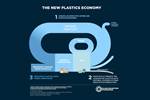Molson Coors Discusses Incorporating More Recycled Content In Its Plastic Packaging
The company is working with Loop Industries to upcycle the company’s PET packaging.
Molson Coors Brewing Co. launched a set of new global packaging goals, aiming for 100% of its packaging to be reusable, recyclable, compostable or biodegradable by 2025. It is also strengthening its goals to drive down packaging emissions, use more recycled materials in its plastic packaging and improve recycling solutions in its key markets.
“From our standpoint as a consumer products good company, we have a significant role to play to help reduce plastic waste,” says Kim Marotta, global senior director of corporate responsibility at Molson Coors.
The company’s 2025 goals include:
- 30% recycled content in all plastic packaging
- 26% reduction in carbon emissions from packaging
- participating in recycling solutions to increase recycling rates or reduce waste in priority markets.
- In addition, the strategy includes plans to move from a five-layer PET bottle to a three-layer bottle in the US to enhance its recyclability.
While plastics comprise less than 2% of global packaging mix by weight, the company seeks to achieve at least 30% recycled content in its PET bottles, plastic film wrap and plastic rings.
Marotta says the company is exploring new technology such as working with Loop Industries, whose breakthrough technology allows for all types of waste PET plastic to be upcycled into high purity, food-grade PET plastic.
“So for instance with our PET bottles, we’re looking to upcycle them into PET bottles again,” she says. “We will conduct a test pilot, which will help build innovation in the U.S. and eventually in Germany.”
The company has joined The Recycling Partnership, a group of 45 brands promoting more jobs in the circular economy, more material recovery and stronger, more equitable communities within the US. As a multinational company, Molson Coors is also taking the commitment global. The company has signed on to the New Plastics Economy Global Commitment, which is a worldwide initiative led by the Ellen MacArthur Foundation in collaboration with UN Environment that addresses plastic pollution and waste at its source by applying circular economy principles.
“When we look at recycling and the need to move the needle, it’s important for companies to innovate and also important for consumers to engage and respond,” Marotta says. “We have to do so many things to create change and part of the problem with recycling is that it’s complicated and just isn’t getting done. When we partner with other industries, NGOs and governments to create change, we think it’s a really important thing to do so.”
Related Content
-
Multilayer Solutions to Challenges in Blow Molding with PCR
For extrusion blow molders, challenges of price and availability of postconsumer recycled resins can be addressed with a variety of multilayer technologies, which also offer solutions to issues with color, processability, mechanical properties and chemical migration in PCR materials.
-
NPE2024 Wrap-Up: Sustainability Dominates Show Floor News
Across all process types, sustainability was a big theme at NPE2024. But there was plenty to see in automation and artificial intelligence as well.
-
Inside the Florida Recycler Taking on NPE’s 100% Scrap Reuse Goal
Hundreds of tons of demonstration products will be created this week. Commercial Plastics Recycling is striving to recycle ALL of it.
















